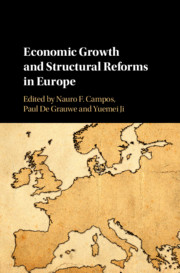Book contents
- Economic Growth and Structural Reforms in Europe
- Economic Growth and Structural Reforms in Europe
- Copyright page
- Contents
- Figures
- Tables
- Contributors
- Introduction
- Part I Economic Growth and Structural Reforms in Europe
- Part II Macroeconomic Implications of Reforms
- 4 Heterogeneous Market Regulation and Divergence in a Currency Union
- 5 Macroeconomic Imbalances in the Euro Area
- 6 Financial Crises and Liberalization
- 7 Structural Reforms and Fiscal Sustainability
- 8 Transitions in the EU Labour Market before and after the Crisis
- 9 On the Complementarity between Labour Market Regulation and Tax Reforms in the European Union
- Part III Case Studies
- Conclusions
- Index
- References
6 - Financial Crises and Liberalization
Progress or Reversals?
from Part II - Macroeconomic Implications of Reforms
Published online by Cambridge University Press: 31 March 2020
- Economic Growth and Structural Reforms in Europe
- Economic Growth and Structural Reforms in Europe
- Copyright page
- Contents
- Figures
- Tables
- Contributors
- Introduction
- Part I Economic Growth and Structural Reforms in Europe
- Part II Macroeconomic Implications of Reforms
- 4 Heterogeneous Market Regulation and Divergence in a Currency Union
- 5 Macroeconomic Imbalances in the Euro Area
- 6 Financial Crises and Liberalization
- 7 Structural Reforms and Fiscal Sustainability
- 8 Transitions in the EU Labour Market before and after the Crisis
- 9 On the Complementarity between Labour Market Regulation and Tax Reforms in the European Union
- Part III Case Studies
- Conclusions
- Index
- References
Summary
Financial crisis could play a key role in changing the policy equilibrium concerning financial markets and institutions. Using a recent comprehensive dataset on financial liberalization across ninety-four countries for the period between 1973 and 2015, we formally test the validity of this prediction for the member states of the European Union as well as a global sample. We contribute by (a) using a new up-to-date dataset of reforms and crises and (b) subjecting it to a combination of difference-in-differences and local projection estimations. In the global sample, our findings on the causal relationship between crises and liberal reforms consistently point out a negative direction between the two, suggesting that governments react to crises by intervening in financial markets. However, in a dynamic setting with impulse responses, we also illustrate that such interventions are only temporary and liberalization process restarts after a financial crisis. In the EU sample, however, we do not find sufficient evidence to support either of these observations.
- Type
- Chapter
- Information
- Economic Growth and Structural Reforms in Europe , pp. 177 - 213Publisher: Cambridge University PressPrint publication year: 2020
References
- 1
- Cited by



